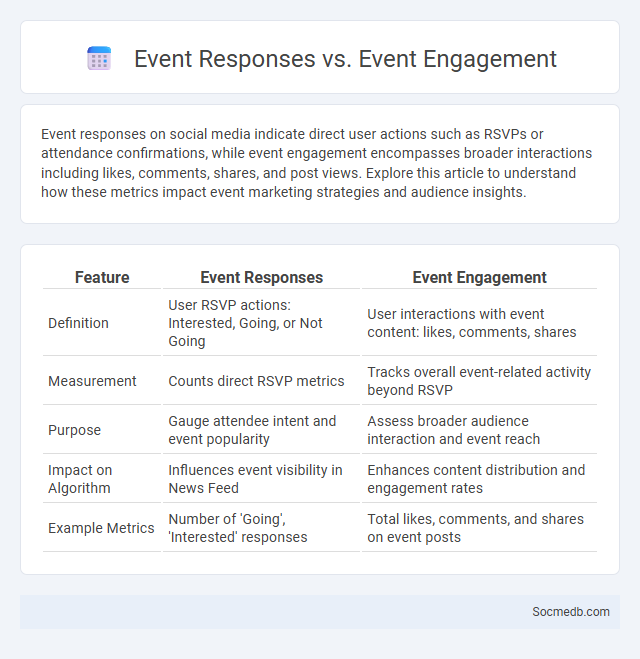
Photo illustration: Event Responses vs Event Engagement
Event responses on social media indicate direct user actions such as RSVPs or attendance confirmations, while event engagement encompasses broader interactions including likes, comments, shares, and post views. Explore this article to understand how these metrics impact event marketing strategies and audience insights.
Table of Comparison
| Feature | Event Responses | Event Engagement |
|---|---|---|
| Definition | User RSVP actions: Interested, Going, or Not Going | User interactions with event content: likes, comments, shares |
| Measurement | Counts direct RSVP metrics | Tracks overall event-related activity beyond RSVP |
| Purpose | Gauge attendee intent and event popularity | Assess broader audience interaction and event reach |
| Impact on Algorithm | Influences event visibility in News Feed | Enhances content distribution and engagement rates |
| Example Metrics | Number of 'Going', 'Interested' responses | Total likes, comments, and shares on event posts |
Understanding Event Responses: Definition and Importance
Understanding event responses in social media involves analyzing how users react to specific posts, campaigns, or live events, providing valuable insights into audience engagement and sentiment. Accurate measurement of event responses helps optimize content strategies, improve real-time interaction, and increase overall brand awareness. You can leverage these insights to tailor your social media efforts, ensuring higher relevance and impact for your target audience.
What Constitutes Event Engagement?
Event engagement on social media encompasses interactions such as likes, comments, shares, RSVPs, and hashtag participation that demonstrate active user involvement. Metrics like click-through rates, live video views, and post-event feedback also contribute to gauging the level of audience connection. Your ability to analyze and foster these engagement signals drives the overall success and reach of your event campaigns.
RSVP: Meaning and Modern Usage
RSVP stands for the French phrase "Repondez s'il vous plait," meaning "please respond," and it plays a crucial role in social media event planning by prompting Your guests to confirm attendance. Modern usage extends beyond traditional invitations, integrating RSVP functions into platforms like Facebook, Instagram, and event-specific apps to streamline guest management and enhance user engagement. Leveraging these digital RSVP tools ensures accurate headcounts and efficient communication, making Your event organization seamless and effective.
Key Differences Between Event Responses and Event Engagement
Event responses on social media specifically track user actions such as attending, interested, or not attending an event, providing measurable data on audience intent. Event engagement encompasses broader interactions including likes, comments, shares, and post clicks related to the event, reflecting overall user involvement and sentiment. Understanding these differences helps marketers tailor strategies to boost participation and create meaningful conversations around the event.
The Role of RSVP in Event Planning
RSVP plays a crucial role in social media-driven event planning by enabling precise attendee tracking and engagement prior to the event. Platforms like Facebook and Instagram integrate RSVP features that provide real-time data, helping organizers manage guest lists and tailor event logistics efficiently. This digital confirmation process enhances event marketing strategies by boosting user interaction and optimizing resource allocation.
Measuring Success: Responses vs. Engagement vs. RSVP
Measuring success on social media requires analyzing responses, engagement, and RSVP metrics to understand audience interaction and event participation accurately. Responses indicate direct communication from users, engagement encompasses likes, shares, and comments reflecting content impact, while RSVP tracks confirmed attendance for events. Prioritizing these metrics helps optimize campaign strategies and improve targeted outreach.
How Event Engagement Drives Attendance
Event engagement on social media platforms significantly boosts attendance by creating excitement and fostering community interaction before the event. Interactive content such as polls, live Q&A sessions, and shareable event updates increase visibility and encourage potential attendees to commit. Leveraging targeted hashtags and user-generated content amplifies reach and builds social proof, driving higher turnout rates.
Best Practices for Maximizing Event Responses
Leveraging targeted hashtags and geo-tags significantly boosts event visibility and user engagement on social media platforms. Crafting visually compelling content with clear call-to-actions enhances audience interaction and drives higher RSVP rates. Scheduling posts during peak activity hours aligned with the event's demographic maximizes reach and response effectiveness.
Leveraging RSVP Tools for Better Event Outcomes
Leveraging RSVP tools enhances event planning by streamlining guest management and providing accurate attendance data, which improves resource allocation and reduces no-shows. Integrating social media platforms with RSVP tools increases event visibility and engagement through targeted invitations and real-time updates. Advanced analytics from these tools offer insights into attendee behavior, enabling organizers to tailor experiences and optimize future events.
Integrating Responses, Engagement, and RSVP for Event Success
Integrating responses, engagement, and RSVP tracking on social media platforms streamlines event management and boosts attendance rates. Utilizing tools like Facebook Events or Instagram Stories allows you to monitor real-time interactions and adjust your outreach strategies effectively. Your active engagement with attendees through comments and direct messages enhances trust and encourages more accurate RSVP counts, leading to successful event outcomes.
 socmedb.com
socmedb.com